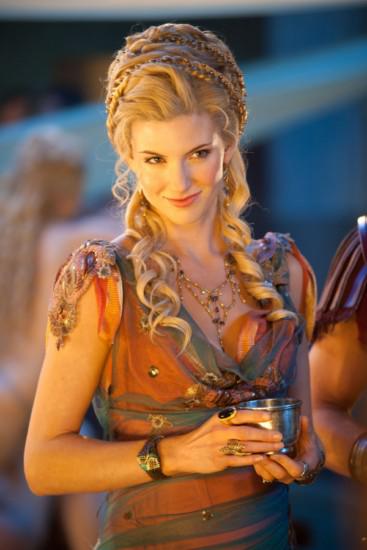Contributor: John Keegan
As entertaining as this episode might have been, especially by the end, it was somewhat weaker than what we’ve come to expect of the series. I believe it had much to do with the artificial conceit of having Spartacus running with a handful of supporters (including the increasingly badass Mira), a wounded Tiberias, and Naevia. And Naevia is a big part of the equation, because as understandable as her reactions might be, they are still grating on the nerves.

Part of the problem is that it’s not made particular apparent at the onset that Spartacus has been separated from the bulk of his fugitive forces. The Romans, when defending their ridiculous tactics to Ashur (who is pointing out the obvious), speak as though Spartacus and his little band are all that remain, after a slaughter at the mines. Logically, history doesn’t play out that way, so it all felt overly contrived. We know Spartacus, along with plenty of his rebels, get to Vesuvius. Thankfully, that’s where the episode points at the end, but it was an oddly uninvolving journey getting there.
But the problems are not confined to that element of the story; the intrigues within the former House of Batiatus are hampered by a lack of standout performances. To be sure, Lucy Lawless and Viva Bianca play Lucretia and Ilithyia to perfection; they more than hold one’s attention when they are on screen. But I am finding less and less to like about Seppia and Seppius, who seem to be rather aimless, thanks to the indecision on how to play out their incestuous side without appearing to ape the Lannisters on “Game of Thrones”.
I would see that as a minor annoyance, easily dismissed, if it wasn’t for the other prominent issue with the Capuan intrigue. Ilithyia recognizes that her husband’s star is falling, and that Varinius has captured the political favor of her father. Being a woman with clear designs on high station and influence, she does the natural thing and makes a move to gain Varinius’ interest (hardly difficult), despite Seppia’s own schemes.
Sadly, Varinius is just not that interesting a character right now, and with Seppia’s side of the story lacking, it all falls a bit flat. That is, until Ilithyia gleefully skewers one of the captured gladiators and then allows Varinius a certain degree of hands-on access. Another memorable confrontation with Lucretia only serves to remind us that their long-standing history is far more involving than the subtle sparring of Glaber and Varinius. The writers struggle to find a suitable way to replace the loss of John Hannah and Batiatus from the series.
I can’t say that it was a terrible episode, by any means, but it wasn’t quite on par with what I’ve come to expect from “Spartacus”. The strength of the series has never been the gratuitous elements; those are the window dressing for the core plot and character arcs. And those depend on solid casting, which right now, is still a question mark, since few of the cast members added for the second season appear to be as strong as those remaining from “Blood and Sand”.
Writing: 2/2
Acting: 1/2
Direction: 2/2
Style: 2/4
Final Rating: 7/10

